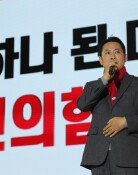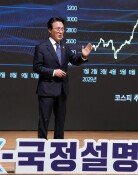Japan`s lower house dissolved, liberal party to retake power
Japan`s lower house dissolved, liberal party to retake power
Posted November. 17, 2012 00:59,
After Takahiro Yokomichi, the speaker of Japans House of Representatives, declared the dissolution of the lower house of parliament at 3:50 p.m. Friday, lawmakers got up on their feet, shouted "Hurrah" three times, and applauded.
The moment marked the humble end of the Democratic Party of Japans 39-month reign, which started amid high expectations after ending 54 years of parliamentary control by the Liberal Democratic Party.
Political parties in Japan have begun a full-fledged race for the Dec. 16 general elections, but the liberal party returning to power is widely considered a done deal. Japans financial markets are fluctuating in response to comments from Shinzo Abe, who is expected to become the next prime minister. A number of Democratic Party lawmakers have abandoned their sinking ship, while other politicians are reorganizing.
○ End of Democratic Partys 39-month rule
Prime Minister Yoshihiko Noda decided to dissolve the lower house in a Cabinet meeting Friday morning in unanimous agreement with members. Though lawmakers terms end in August next year, the Noda administration has lost steam as its job approval rating hit rock bottom. A fierce political standoff has paralyzed the government, and the ruling partys collapse is blamed on its failure to keep its promise of costly welfare programs.
With the lower house dissolved, minor parties are scurrying to reorganize themselves. The media spotlight is on Toru Hashimoto, head of the Japan Restoration Party, and Shintaro Ishihara, head of the Sunrise Party. As the Liberal Democratic Party is unlikely to a majority in the lower house, the vote-winning power of both men is expected to be a key factor in Japans political realignment. As they seek to unify right-wing groups, they are expected to exert big influence over Japans right-wing shift.
On Friday, Ishihara proposed to Hashimoto the merger of the third force in Japan. Hashimoto, however, upped the ante by citing differences on key issues between both sides, including on nuclear power and Japans participation in negotiations to join the Trans-Pacific Partnership free trade agreement.
○ Abe gains political weight
As the Liberal Democratic Party is likely to win the most seats in the upcoming elections, its chief Abe has gained heavy political weight in his words. In an economic forum in Tokyo Thursday, he said the Cabinet led by his party will implement an unlimited monetary easing policy to boost the sluggish Japanese economy, setting an inflation target of 2 to 3 percent to alleviate deflation.
He also proposed zero-interest and non-taxable treasury bonds to induce money locked in savings. As bearers of the bonds are exempt from inheritance tax, the debt papers are expected to induce more money into the market. Abe said he will implement policies different from the ones previously implemented by his party.
Japans foreign exchange market reacted sensitively to his comments, suggesting that the launch of a government led by the liberal party is a done deal. In Tokyo, the yen traded at 81.17 against the U.S. dollar at one point Friday, weakening by 0.33 point and the yen`s first dip below 82 since April 27. The main Nikkei average closed at 9,024.16, recovering to the 9,000 level for the first time in nine business days.
lovesong@donga.com




![넘치는 전재수 과거 사진들…유죄의 증거일까, 무죄의 증거일까[청계천 옆 사진관]](https://dimg.donga.com/c/138/175/90/1/wps/NEWS/IMAGE/2025/12/20/132997378.1.jpg)


